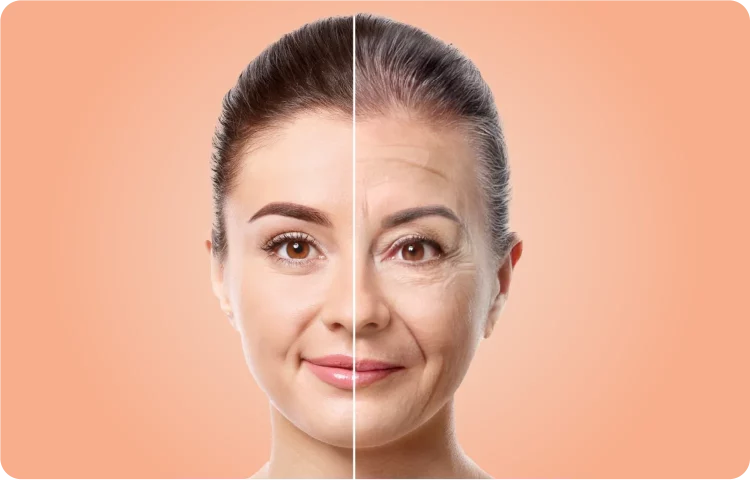Introduction
As the years pass by, many of us find ourselves faced with the inevitable process of aging. While aging is a natural and beautiful part of life, society often promotes the idea of “anti-aging,” pushing us to fight against the hands of time. However, in this pursuit, many miss the opportunity to age gracefully—a more sustainable, holistic, and mindful approach to embracing the passage of time.
Aging gracefully is not about trying to reverse time but about growing older in a way that enhances our quality of life and nurtures our body, mind, and spirit. It’s about adopting a philosophy of living well, rather than simply looking young. In this article, we’ll explore why it’s crucial to begin the process of aging gracefully, why we should avoid the pursuit of rapid, artificial anti-aging methods, and how we can approach aging with intention and awareness.
Understanding Graceful Aging
What Is Graceful Aging?
Aging gracefully refers to the ability to age with dignity, health, and contentment. It means accepting the inevitable changes that come with time—whether they involve wrinkles, graying hair, or slower physical movements—while continuing to live a fulfilling life. Unlike quick fixes that promise immediate results, graceful aging focuses on a long-term approach to health and wellness.
Why Is Graceful Aging Important?
Graceful aging allows individuals to maintain a sense of self and live in harmony with their changing bodies. It promotes mental clarity, encourages emotional stability, and ensures physical health well into older years. By taking proactive steps in maintaining physical activity, mental well-being, and a balanced diet, you are setting the foundation for long-term health rather than relying on superficial, temporary solutions.
The Dangers of Aging “Quickly”
The Appeal of Quick Fixes
Today, the beauty and wellness industries offer a myriad of products and treatments designed to reverse the signs of aging. From Botox injections and plastic surgeries to miracle pills and serums, there’s a temptation to look for fast solutions that promise to turn back the clock. But while these treatments may provide immediate visual results, they come with their own set of risks and drawbacks.

The Health Risks of Quick Anti-Aging Solutions
One of the primary concerns with rapid anti-aging methods is the potential health risks involved. Overuse of Botox, for instance, can lead to muscle weakness or even paralysis in extreme cases. The long-term effects of invasive cosmetic procedures can also be unpredictable, with scarring, infections, or disfigurement being possible side effects. Additionally, many of the treatments are short-term and require constant upkeep, which can place a strain on both your wallet and mental well-being.
The Psychological Impact of Anti-Aging Obsession
The pursuit of youthfulness at all costs can also take a psychological toll. Constantly comparing yourself to idealized beauty standards or attempting to live up to unrealistic expectations can lead to feelings of inadequacy, anxiety, and low self-esteem. In the process of trying to look “perfect,” individuals may lose touch with the beauty of their natural selves and their inherent worth beyond physical appearance.
Aging Gracefully: The Mind-Body Connection
Embracing Physical Changes
One of the key components of aging gracefully is recognizing and embracing the physical changes that occur with time. While it’s natural for our bodies to undergo transformations—such as skin losing its elasticity or joints becoming stiffer—it’s important not to focus solely on appearance. Instead, focus on maintaining a healthy lifestyle that supports mobility, flexibility, and strength.
Regular exercise is one of the best ways to age gracefully, as it helps maintain muscle tone, bone density, and cardiovascular health. Activities like yoga, walking, or swimming are fantastic for seniors as they promote joint flexibility, balance, and overall well-being.
Nutrition: Fueling the Aging Body
Nutrition plays a crucial role in graceful aging. As we age, our bodies’ metabolism naturally slows down, making it more important to focus on a well-balanced diet that supports both physical and cognitive function. Antioxidant-rich foods, such as berries, leafy greens, and nuts, help protect against cell damage, while foods high in Omega-3 fatty acids (like fish and flaxseeds) promote heart health.
Maintaining a hydrated body is another essential element. Water helps flush toxins, supports skin health, and maintains joint lubrication. Additionally, adopting mindful eating practices, such as portion control and eating nutrient-dense meals, can aid in preventing age-related weight gain.
The Role of Mental and Emotional Health
Keeping the Mind Active
One of the most powerful ways to age gracefully is by keeping the mind sharp. As we get older, mental health and cognitive function can decline, but mental exercises can help slow this process. Engaging in activities like puzzles, reading, learning new skills, or even taking up a hobby can keep the mind active and reduce the risk of dementia and other cognitive disorders.
Mindfulness practices, such as meditation or deep breathing, also promote mental clarity, reduce stress, and improve emotional regulation. The ability to stay grounded and present is an essential part of graceful aging.

The Importance of Emotional Well-being
Equally important to mental health is emotional well-being. Aging gracefully involves cultivating an attitude of acceptance, patience, and self-compassion. Letting go of the societal pressures to look a certain way or be perpetually young can free us from the constant stress of chasing an ideal. Embracing positive relationships, seeking joy in everyday experiences, and finding fulfillment in personal achievements can help create a sense of emotional peace.
Having a support system—whether it’s family, friends, or a community—can make all the difference in how we navigate the aging process. Emotional well-being is key to maintaining a fulfilling and active life as we grow older.
Practical Steps to Start Aging Gracefully
1. Focus on Prevention, Not Just Treatment
Aging gracefully begins with taking preventive steps before signs of aging become noticeable. This means establishing good habits early on, like sun protection (to avoid wrinkles and skin cancer), exercise, and maintaining balanced nutrition. The earlier you start taking care of your body, the easier it will be to maintain your health as you age.
2. Stay Active Socially and Mentally
Maintaining an active social life can keep your spirits high and provide the emotional support you need as you age. Whether it’s joining a book club, volunteering, or simply spending time with loved ones, strong social connections are critical to overall well-being. Additionally, stay mentally stimulated by learning new things, exploring new hobbies, and keeping your cognitive function sharp.
3. Cultivate a Positive Mindset
The mindset you adopt as you age can significantly impact how you experience the process. By choosing to focus on the joys and opportunities of growing older—rather than the challenges—you’ll find yourself aging with grace. Practice gratitude, embrace your strengths, and learn to accept the changes that come with time.
4. Avoid Comparisons
It’s easy to fall into the trap of comparing yourself to others, especially in a society that glorifies youth. However, true grace comes from recognizing your unique beauty, experiences, and wisdom. Embrace the aging process as a part of your personal journey.
Conclusion
Aging gracefully isn’t just about slowing down the visible signs of aging. It’s about embracing the changes that come with time while nurturing your body, mind, and spirit in a holistic, balanced way. By choosing to age gradually and with intention, you’ll experience a richer, more fulfilling life, one that celebrates growth, wisdom, and resilience rather than fighting against the natural process.
Start now, because it’s not about how quickly you can look young, but about how gracefully you can grow












































